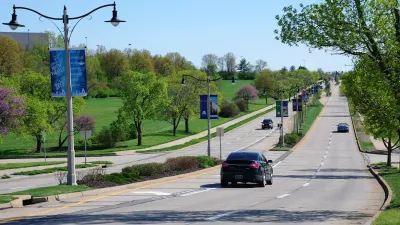California State Senator Darrell Steinberg tackles the connections between land use and greenhouse gas emissions with SB 375. Can California continue its leadership on climate change legislation?
"Many of us on the Democratic side feel that, while market-based mechanisms are important and should be part of the strategy, if we aren't aggressive in looking at the regulatory side, we're not going to meet the goals. The Republican side feels that if we regulate, we're going to harm the economy. So it's about finding the right balance while remaining committed to the goal, because as much as AB 32 is landmark legislation, it will mean very little if we don't implement it in the spirit in which it was intended."
"Senate Bill 375 is the lead bill in this area. It is a very important yet fairly modest measure, because it requires the 18 metropolitan planning organizations across the state of California to show that their future planning scenarios will result in a reduction in carbon. The requirement will engage regions in a process similar to a process pioneered in my region of Sacramento, known as "the blueprint," which essentially says that we need to plan as a region, not just as individual cities and counties. Air quality, traffic congestion, and carbon know no artificial boundaries. These issues must be tackled regionally."
"...we finally have a context from which to address the issues of land use and regional planning. We haven't had that context before.
We pled the advocates for this kind of approach, we pled good government, we pled reforming the finance and fiscal system, and there have been numerous reports and study groups that have recommended various changes to the way we fund state and local governments, and it's all kind of dropped like a lead balloon.
Now, everyone is embracing climate change, and there is a consensus that land use has to be part of the mix. As we change to cleaner fuel, we also need to build communities so that people are reducing the number of miles they're traveling."
Thanks to James Brasuell
FULL STORY: Legislating The Connection Between Land Use, Climate Change

Planetizen Federal Action Tracker
A weekly monitor of how Trump’s orders and actions are impacting planners and planning in America.

USGS Water Science Centers Targeted for Closure
If their work is suspended, states could lose a valuable resource for monitoring, understanding, and managing water resources.

End Human Sacrifices to the Demanding Gods of Automobile Dependency and Sprawl
The U.S. has much higher traffic fatality rates than peer countries due to automobile dependency and sprawl. Better planning can reduce these human sacrifices.

Seattle Transit Asked to Clarify Pet Policy
A major dog park near a new light rail stop is prompting calls to update and clarify rules for bringing pets on Seattle-area transit systems.

Oregon Bill Would End Bans on Manufactured Housing
The bill would prevent new developments from prohibiting mobile homes and modular housing.

Nashville Doesn’t Renew Bike Share Contract, Citing Lost Federal Funding
The city’s bike share system, operated by BCycle, could stop operating if the city doesn’t find a new source of funding.
Urban Design for Planners 1: Software Tools
This six-course series explores essential urban design concepts using open source software and equips planners with the tools they need to participate fully in the urban design process.
Planning for Universal Design
Learn the tools for implementing Universal Design in planning regulations.
Tyler Technologies
New York City School Construction Authority
Village of Glen Ellyn
Transportation Research & Education Center (TREC) at Portland State University
Chaddick Institute at DePaul University
Institute for Housing and Urban Development Studies (IHS)
Regional Transportation Commission of Southern Nevada
Toledo-Lucas County Plan Commissions


























